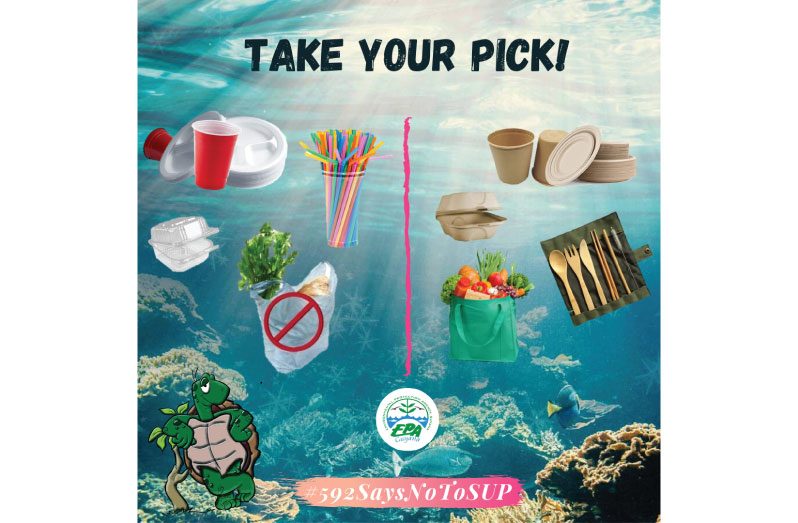THE year 2021 has been designated for the systematic banning of single-use plastics (SUPs) in Guyana. The Environmental Protection Agency (EPA) is leading implementation of the ban on single-use plastics. Preparations for the ban have commenced since 2018 and the EPA has been making deliberate efforts to ensure the process is participatory and stakeholders are adequately engaged. Given Guyana’s commitment to addressing the issue of plastic pollution and the Agency’s role in providing a safe and healthy environment for all, the agency has amplified its media presence and transitioned to conducting virtual consultations, given the COVID-19 pandemic and guidelines for social and physical distancing.
Prior to the prevailing COVID-19 pandemic, the EPA has conducted a series of consultations with the public and several business stakeholders including supermarkets, non-government organisations, as well as, importers and distributors of single-use plastics or biodegradable alternatives to single-use plastics. The virtual consultations like the physical ones also aimed to educate the public on the impending ban on single-use plastics the ban, discuss the potential impacts the ban may have on different sectors, along with opportunities for businesses to make recommendations to remedy any possible social and economic gaps, which may arise as a result of the ban.
Some major concerns the agency received thus far were centred on the availability of alternatives for the proposed items to be banned, increased education and awareness campaigns targeting the business community and fiscal incentives to support the local development of alternatives.
The EPA is grateful for the positive response received to continue engagements virtually and has over the past three months met with some critical stakeholders representing: the Guyana Tourism Authority (GTA); the Guyana Manufacturing and Services Association (GMSA); hotels, resorts, restaurant and bars; the Georgetown Chamber of Commerce and Industry (GCCI); commercial banks; the Institute of Private Enterprise Development (IPED); the Small Business Bureau; international NGOs, international funding agencies, research institutions; and entrepreneurs engaged in importing or manufacturing alternatives to SUPs.
The agency has also conducted several virtual sessions and challenges targeting our over 10, 000 social media followers, in addition to our other media programmes, and publication of awareness materials. We have partnered with the two (2) telephone companies to send blast text messages to over four hundred thousand (409,000) subscribers. Approximately 4000 posters have been printed to be distributed to the business community, along with other materials such as a ‘Frequently asked questions booklet’ which will be available soon. The results of the public engagements are being analysed and will be shared with members of the public. The Agency is not oblivious to the COVID 19 pandemic and the period for implementation of the ban will consider the economic recovery period. It will also be informed by the results of the consultations conducted.
Please share your views by taking part in the public survey being circulated on our social media pages.
#592SaysNoToSUP
You can share your ideas and questions by sending letters to: “Our Earth, Our Environment”, C/O Communications Department, Environmental Protection Agency, Ganges Street, Sophia, GEORGETOWN, or email us at: eit.epaguyana@gmail.com or follow us on Facebook and Instagram.



.jpg)










